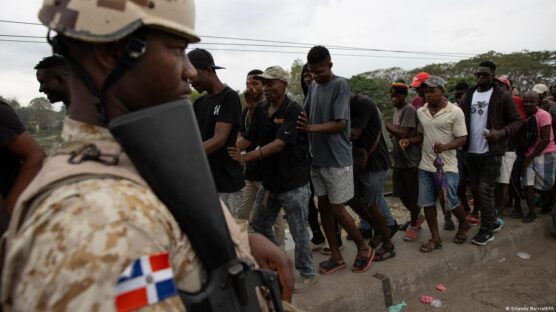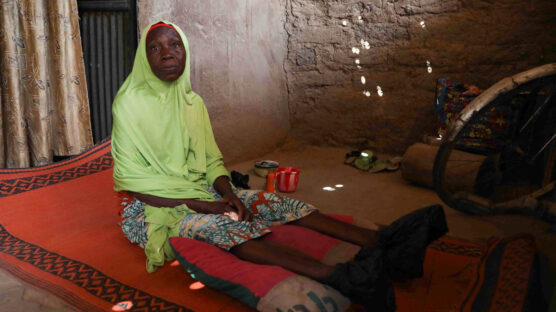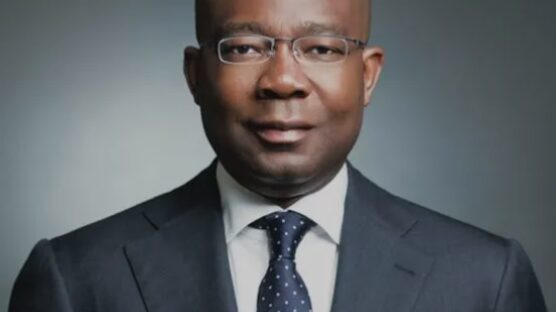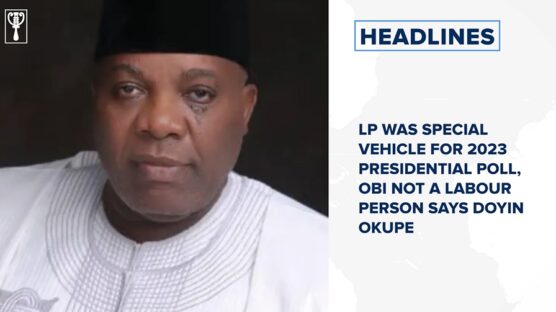IPOB will never resort to arms violence – Nnamdi Kanu
By Channels
24 August 2017 |
5:39 am
IPOB will never result to arms violence - Nnamdi Kanu
In this article
Related
Related
30 Mar
A new UN report detailed different types of gang violence which have intensified this year. Gangs have taken over much of the capital, and staged an insurrection to overthrow Prime Minister Ariel Henry.
30 Mar
French Prime Minister Gabriel Attal signals a further tightening of unemployment benefits as France seeks to reduce an unexpectedly large budget deficit. Meanwhile, the government rules out new taxes, despite calls from French lawmakers to tax corporate windfalls and share buybacks. We take a closer look in this edition.
30 Mar
Members of St. Francis Catholic Church reenact the Stations of the Cross, suffering and death of Jesus during Holy Friday in Ikeja, Lagos, Nigeria.
10 Apr
Nigeria has begun the rollout of the MenFive vaccine in high-risk areas, securing millions of doses to protect children from all five strains of meningitis. The potentially fatal disease poses a grave threat to young children globally, with sub-Saharan Africa being particularly vulnerable to it.
13 Apr
Nigeria's government says the rise will only affect 1.5 million consumers, mostly manufacturers. But analysts believe the hike will lead to higher inflation and result in job losses and closures of businesses.
12 Apr
A decade on, the world has largely forgotten about the Chibok girls, who were kidnapped by Nigeria's Boko Haram Islamist militants. But for victims and their families, like Solomon Maina, who is still waiting for news about his daughter, the tragedy is ongoing.
Latest
2 hours ago
Aigboje Aig-Imoukhuede, the Chairman of Access Holdings says the move by the group to raise $1.5 billion over five years reflects the financial institutions growth plans. Speaking with CNBC Africa's Kenneth Igbomor, Aig-Imoukhuede reiterates that the decision for a rights issue was in line with the role of its shareholders in the growth of the bank over the years.
2 hours ago
Infusions, anti-aging creams or anti-stress drops made from cannabis are some of the food supplements that Morocco will begin to market imminently and that are already on display at the International Agriculture Exhibition (SIAM) inaugurated this Monday, after legalization of this plant in 2021 for pharmaceutical and industrial uses.
2 hours ago
Since 2015, the number of malaria cases worldwide have stalled and ― in some areas, they're even increasing. That's after two decades of falling numbers. What's going on?
1 day ago
Find these stories and much more when you grab a copy of The Guardian on Wednesday.
1 day ago
The heat of the Premier League title race is on and big games are coming this midweek. Arsenal at the Emirates will take on Chelsea, Everton will entertain Liverpool, and Manchester City will be up against Brighton. Ayomide Sotunbo and Hogan Niyi preview the games in this week's edition of The Nutmeg.
1 day ago
Turkey's president Recep Tayyp Erdogan was in Iraq this Monday - his first official visit in years, where he signed a raft of deals to try and reset rocky relations. High on the agenda was the water issue, stemming from Turkey's construction of dams on the Tigris and Euphrates rivers that reduced the supply downstream to Iraq.
×

Get the latest news delivered straight to your inbox every day of the week. Stay informed with the Guardian’s leading coverage of Nigerian and world news, business, technology and sports.


















1 Comments
Before August 9, 1965, the Singaporeans were seen as an irritation in Malaysia. Then Singapore was one of the 14 states of Malaysia. Singaporeans were viewed as arrogant, stubborn, and domineering. While the United Malays National Organisation wanted affirmative action or “quota system” for the Malays, the People’s Action Party of the Singaporeans insisted that the best thing for the country was a merit-based policy on all issues, so as to bring out the best in the nation and create a spirit of excellence.
This constant disagreement and tension resulted in race riots. It got to a point where the Malays could take it no more. So on August 9, 1965 they convened the parliament, with no Singaporean parliamentarian present. At that sitting, the legislators voted unanimously (126 – 0) to expel Singapore from Malaysia.
When the Singaporeans heard that they had been expelled from the nation, at first they were devastated. But they took their fate in their hands and started building a new nation. And, indeed, by applying merit and the pursuit of excellence, Singaporeans built a country that moved from the Third World to First World in record time, overtaking Malaysia in all ramifications.
Interestingly, despite this sad way of parting, Malaysia and Singapore have remained good neighbours. In spite of the success that the latter has recorded, it has not made Malaysia not to record its own success.
There are many similarities between the story of Singapore and Malaysia and the Igbo and Nigeria. The Igbo are not happy with the quota system policy used in the admission into federal schools and federal positions. They want competitiveness in every sector, which will lead to the best being selected, for the sake of excellence.
The Igbo are seen as arrogant, noisy, domineering, greedy, over-ambitious, to mention but a few. Many Nigerians see them as irritants. They get killed frequently, especially in the North, at the least misunderstanding. Sometimes the cause of the provocation is someone from Denmark, Cameroon or another part of Nigeria.
The six states that scored above 50 per cent in the 2015 West African Senior School Certificate of Education were: Abia (63.94%), Anambra (61.18%), Edo (61.05%), Rivers (55.69%), and Imo (52.49%). The states that scored below 13 percent in the same examination were Kebbi (12.08%), Katsina (10.81%), Gombe (7.41%), Jigawa (6.37%), Zamfara (6.23%), Yobe (4.37%).
These are verifiable results that have remained virtually the same for decades. And they give an idea of the number of candidates that are involved in education from each state and zone, as well as their academic performance.
The point of this essay is not that it is only the Igbo that excel in many sectors. Other ethnic groups, especially from the South, also excel. But the focus of this essay is the Igbo. From the attitude of other ethnic groups, it seems that they are comfortable with the status quo. If not, they should not be focusing on the Igbo as their problem.
Compare that with the academic performance of the different zones of Nigeria. The Unified Tertiary Matriculation Education of 2016 produced the following number of applicants from the six zones:
South-East (five states) = 335,883;
South-West (six states) = 320,691;
South-South (six states) = (299,632);
North-Central (six states plus the FCT) = 259,846;
North-West (seven states) = 163,240;
North-East (six states) = 96,220.
The six states that produced the highest number of candidates were:
Imo – 104,383Delta – 78,854Anambra – 77,694Osun – 72,752Oyo – 72,298Enugu – 69,381.
The six states that produced the least
We will review and take appropriate action.